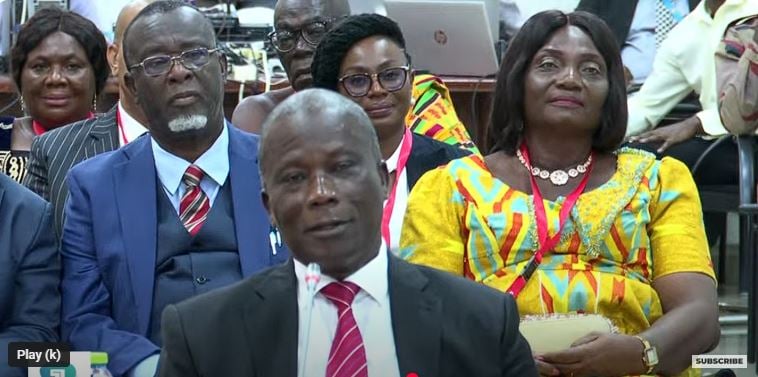Justice Philip Bright Mensah, a nominee for the Supreme Court of Ghana, articulated the significant social constraints inherent in judicial work and the necessity for judges to maintain a certain degree of social detachment to safeguard public trust in the justice system. During his vetting by Parliament’s Appointments Committee, he emphasized the constant public scrutiny judges face, making even innocuous social interactions potentially problematic. This scrutiny, he argued, necessitates a cautious approach to social life, requiring judges to be discerning about their associations and often leading to a degree of self-imposed isolation. This sacrifice of personal and social freedom, he posited, is essential to maintain the perceived and actual impartiality of the judiciary. His statements underscore the delicate balance judges must strike between their personal lives and the demands of their profession.
Justice Mensah’s perspective highlights the unique challenges inherent in maintaining the integrity of the judicial branch. He painted a picture of a life lived under a microscope, where every action, association, and even perceived affiliation is subject to public interpretation and potential misconstrual. This constant awareness of public perception, he suggested, necessitates a degree of self-regulation that goes beyond the explicit ethical guidelines governing judicial conduct. It demands a proactive approach to minimizing potential conflicts of interest, even perceived ones, by carefully curating one’s social circle and limiting exposure to situations that might compromise the appearance of impartiality. This self-imposed restriction on social interactions, he argued, is a necessary sacrifice to uphold the public’s confidence in the judiciary’s ability to dispense justice fairly and without bias.
The nominee’s comments provide insight into the personal costs associated with judicial service. The requirement for judges to maintain a distance from certain social circles represents a significant curtailment of personal freedom. It necessitates a conscious and continuous evaluation of social interactions, demanding that judges consider not only the inherent propriety of their actions, but also how those actions might be perceived by the public. This constant vigilance can lead to a sense of isolation, limiting opportunities for casual social interaction and potentially straining personal relationships. This burden, Justice Mensah suggested, is an unavoidable aspect of judicial life, a necessary sacrifice to maintain the integrity and impartiality of the judicial system.
The discussion around Justice Mensah’s statements underscores the broader challenges faced by judiciaries worldwide in maintaining public trust. In an era of increased scrutiny fueled by social media and heightened political polarization, maintaining the perception of impartiality is more crucial than ever. His insights reveal the pressures judges face to maintain an impeccable public image, not only in their professional conduct but also in their personal lives. This pressure underscores the need for robust ethical guidelines and ongoing training for judges to navigate the complex social landscape and maintain the public’s confidence in the justice system. Furthermore, it raises questions about the societal expectations placed upon judges and the potential for these expectations to impact the diversity of the judiciary, potentially discouraging individuals from seeking judicial appointments.
Justice Mensah’s emphasis on the importance of perceived impartiality illuminates the critical role of public perception in maintaining the legitimacy of the judiciary. He argued that even the appearance of impropriety, regardless of underlying intent, can erode public trust in the justice system. This highlights the importance of transparency and accountability within the judiciary, as well as the need for effective mechanisms to address and dispel any misconceptions or accusations of bias. Furthermore, it underscores the responsibility of the media and the public to engage in informed and responsible discourse regarding judicial matters, avoiding sensationalism and recognizing the potential consequences of unfounded accusations or misrepresentations.
The nominee’s reflections on the social limitations inherent in judicial life provide a valuable opportunity for broader societal reflection on the expectations placed upon judges and the support systems necessary to ensure their ability to function effectively and ethically. His insights highlight the need for a more nuanced understanding of the challenges faced by judges in maintaining both their personal lives and the integrity of the judicial system. This understanding is crucial not only for supporting the well-being of judges but also for ensuring the long-term health and stability of the judiciary as a whole. It calls for a collective effort to foster an environment that supports judicial independence and impartiality, allowing judges to fulfill their crucial role in upholding the rule of law without undue social pressure or unwarranted scrutiny.


